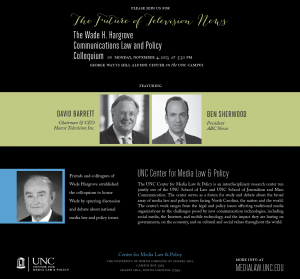
From left to right: Haben Girma, Harvard Law graduate; Elizabeth Ekstrand, daughter of the author; Victoria Ekstrand, UNC asst. professor; and Katie Savage, president of Advocates for Carolina.
There are two (among many) huge assumptions we make when we speak of a right to free speech or free expression.
The first assumption is that such speech can actually be formed.
The second is that such speech will be heard.
For the disabled, neither assumption is a given. The disabled who can speak are often not heard. Their voices are either lost in a crowded marketplace focused on elite influencers or their speech is lacking or misunderstood because of the nature of their disability.
How then do we conceptualize a right of free speech for the disabled? Can we think about the Americans with Disabilities Act (ADA) in connection with a right of free expression? Do we have any case law that might lead us to consider such a connection? (The short answer to this last question, I think, is “yes.” More on that below.)
Haben Girma, the first deaf/blind student to graduate from Harvard Law School, had me reflecting on these questions during her visit last month to UNC. Haben, who was invited by Advocates for Carolina, a student group formed to reflect on life for the disabled on the UNC campus, spoke about her disability and her story to WUNC and to more than 100 students gathered in the Student Union. She now spends her days as a Skadden Fellow at Disability Rights Advocates in San Francisco, where she works to increase the accessibility of digital instructional materials at colleges and universities.
Like others who have struggled to make a life for themselves amidst an able-bodied culture, Haben refused to allow society to shut her out. She has spent her young life problem-solving around a profound inability to engage in the marketplace of ideas as seamlessly as the rest of us do. While certainly no law has directly infringed Haben’s right to free speech, it is very clear that her speech experience has been profoundly different than the experiences of most U.S. citizens.
That raises the question of government responsibility: What is the state’s role, if any, in assuring access to the marketplace of ideas for those whose access is impaired by a physical and/or mental limitation? And how can digital and online media technologies contribute to that access?
It’s a question I’m interested in thinking more about after Haben’s visit and in the wake of a settlement last year between Netflix and the National Association of the Deaf. The Netflix case revolved around the movie service’s “Watch Instantly” on-demand service, which failed to provide closed captioning on all content. The case ended with a consent decree that mandated Netflix provide captions on all streamed programming by 2014.
Federal District Court Judge Michael Ponsor rejected Netflix’s argument that the American with Disabilities Act (ADA) did not require Internet Service Providers and other digital media providers to make accommodations:
“In a society in which business is increasingly conducted online, excluding businesses that sell services through the Internet from the ADA would run afoul of the purposes of the ADA and would severely frustrate Congress’s intent that individuals with disabilities fully enjoy the goods, services, privileges and advantages, available indiscriminately to other members of the general public.”
In other words, the Internet’s marketplace of ideas must and should be accessible to the disabled. This expanded view of the ADA bears watching for its First Amendment implications going forward. In the meantime, I’ll be sending the link to this post to Haben, hoping that she will post a response below.


